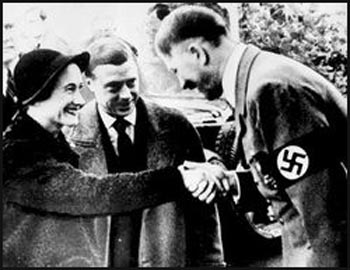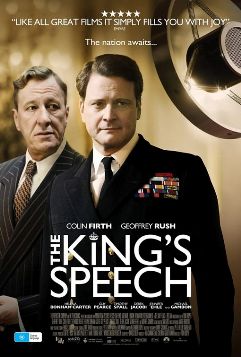February 27, 2011, - 6:56 pm
The King’s Speech, Colin Firth, the Nazis, the Jews & Israel
**** SCROLL DOWN FOR UPDATE ****
In just a few minutes, the insipid, plodding red carpet walk will begin for tonight’s Academy Awards. The Oscars’ glorified sidewalk will be chock full of outrageously paid proud high school graduates (and some high school drop-outs). And the expected, much prognosticated winner of the night is expected to be “The King’s Speech,” a move I chose as 2010’s best (check out my Top Ten Movies of 2010 list), and for which I voted in most categories as a voting member of the Detroit Film Critics Society. But I’m having a little remorse, based on the comments of readers, others, and the information I’ve learned since then, doing my own research. And my remorse includes Colin Firth’s upcoming anti-Israel propaganda project. More on that later.

Wallis Simpson, Edward VIII & Adolf Hitler


First, there’s what others–including many of you, my friends and readers–pointed out. The movie is the story of King George VI of England a/k/a “Bertie” and his relationship with a commoner speech therapist who helps the King overcome his stutter to deliver an important speech, rallying his country around the Allies and against the Nazis in World War II.
But the movie whitewashes this King George’s brother, King Edward VIII–who abdicates the throne because of his marriage to divorcee and well-known slut Wallis Simpson–and his Nazi sympathies. That’s an important historical point, far more important than the much pointed to liberties the movie takes vis-a-vis Kind George VI’s relationship with Winston Churchill. In fact, there is no mention of Ms. Simpson’s sexual affair with German Ambassador to Britain, Joachim von Ribbentrop. The FBI reported that she was passing secret information obtained from her hubby to the Nazi government.
To skip over this is to do much more than a white lie. It is to create utter fiction and do a disservice to the many minds of mush who will take this move as historical truth. They always do. And, frankly, the movie would have been an even stronger contrast between the King brothers, had the movie bothered to briefly point this out. I feel ripped off that it did not. Read more on this from Spartacus Educational.
Then, there’s the point about King George VI’s own behavior toward the Jewish people in Israel, then known as “Palestine” (though almost all of the Palestinians then were Jews, not these Arab Muslim interlopers who’ve usurped the name, today). Obviously, that part of history is neither a subject nor a part of the movie, nor should it be. But that doesn’t mean we can’t take it into account when assessing whether or not King George VI was really a hero–really a man concerned with courage and doing the right thing–as the movie ultimately shows him, in the end.
It was under George VI that Jews–including at least a ship of them trying to escape the Holocaust and being sent back to their certain deaths in Nazi Europe–were kept out of Palestine, while the Arab Muslims were allowed in and were heavily favored by the Brits. And even after the full horrors of the Holocaust and the death camps were known, the Brits under this King had no problem brutally and consistently turning away Jews trying to avoid this and, later, trying to move on from overcrowded displaced persons camps in Europe. That included the ship, Exodus, whose Holocaust survivor passengers were sent back to Germany via France. Helen Thomas would have loved it.
Still, it was better that the King rally his country against the Nazis than not, unlike his King brother. But we would be remiss if we didn’t remember what this King and Winston Churchill and his Parliament did. From Simple to Remember – Judaism Online:
Abba Eban, who was then the Jewish liaison to a special UN committee—called Special Committee On Palestine or UNSCOP—persuaded four UN representatives to go to Haifa to witness the brutality of the British against the Jews.
Historian Martin Gilbert includes Eban’s account of what happened there in Israel: A History (p. 145):
[In Haifa] the four members watched a “gruesome operation.” The Jewish refugees had decided not to accept banishment with docility. If anyone had wanted to know what Churchill meant by a “squalid war,” he would have found out by watching British soldier using rifle butts, hose pipes and tear gas against the survivors of the death camps. Men, women and children were forcibly taken off to prison ships, locked in cages below decks and set out of Palestine waters.
When the four members of UNSCOP came back to Jerusalem, Eban recalled, “they were pale with shock. I could see that they were pre-occupied with one point alone: if this was the only way that the British Mandate could continue, it would be better not to continue it at all.’”
And, of course, when the Arab Muslim nations went to war against Israel and tried to invade, the Brits not only did nothing to stop them; by many accounts they tried to help them against the Jews.
True, the King was little more than a figurehead, as he points out in some of his lines in the movie, and Churchill was really running the show. But, as is also the point of the movie, his speeches were influential and important. And he could have used the bully pulpit against what his government perpetrated and sanctioned in Palestine. But he did not. And today, his progeny, especially grandson, Prince Charles, have their lips permanently affixed to the rears of the Islamic world against the West and Israel.
And finally, there is Colin Firth–the actor who plays King George VI and who is up for an Oscar for Best Actor, tonight. He was excellent in his performance. But I’m no longer rooting for him to win because of what he’s doing next. To add insult to injury regarding the British actions toward the Jews in pre-Israel Palestine, his latest project, “The Promised Land,” is a “thriller” which paints the Brits as heroes and the Jews as terrorists. It focuses on the “Stern Gang” freedom fighters, who put an end to British brutality against the Jews. But that’s not the way leftist revisionists see it or the way this movie does. Because, hey, why not do films portraying Jews as terrorists, since the real modern terrorists–Arab Muslims–are off-limits due to the rules of political correctness, right? Here’s the synopsis of the film:
A police-thriller set in Tel-Aviv and Jerusalem during the British Mandate era in Palestine. It tells the gripping true story of two British police officers Thomas Wilkin, and Geoffrey Morton and their battle to bring to an end the campaign of bombings and assassinations by the extreme right-wing Jewish underground led by the charismatic poet, Avraham Stern. The film culminates when the two policemen track Stern down to his apartment hide-out in Tel Aviv on Mizrachi Street in 1942.
Yes, the “gripping true story,” which is Hollywood code for: our propaganda and lies distorting the true story. By starring in this, Colin Firth is part of those lies and distortions.
The story of how Israel was reborn into the modern Jewish state is a glorious one. But Colin Firth and his ilk want to present you a different one that just ain’t the truth.
Just the way King George VI–stutter or not–and Sir Winston Churchill would have told it.
Well, tonight, I guess I’ll just be cheering on the “True Grit” (read my review), a truly American story.
**** UPDATE: Reader/writer Joel has a different take:
He was not prime minister during the “squalid war,” and in fact opposed it, noting that it was covering Britain in “blood and shame.”
King Bertie was a fan of Neville Chamberlain, and was the first to receive him when he returned from Munich.
Alas, historical movies are not history; they’re “based on” history. I appreciate that heroes have to be made more heroic and villains more villainized in order for a movie to get made. All things considered, I’m grateful that the movie, though it alters history, returns us to the days of extolling virtuous behavior. Unlike, say, Social Network, which lionized solipsism. Consider that if the movie portrayed Bertie as he really was: (a) the movie wouldn’t have been made, and (b) the audience’s affection for him, and its rooting interest in his success, would have been vitiated. The movie succeeded in making us care for a man with an affliction who had to overcome it in order to help rally his nation against an immense evil. Because it did that so well, and because it was been so successful, we can now reasonably expect more movies that celebrate virtue–movies that would’ve stood near-zero chance–to get made. It has made the studios realize that adults love mature subjects. That’s something to cheer, distorted history or not.
That’s true. But it’s always troubling that too many of these same mature adults believe what’s in these movies as “the gospel,” and it can distort our view of history.
Tags: Abba Eban, Adolf Hitler, Arab Muslims, Arabs, Avraham Stern, Bertie, British, British Mandate, Colin Firth, Duke of Windsor, Hitler, Holocaust, Holocaust survivors, Israel, Jews, Joachim von Ribbentrop, King Edward VIII, King George VI, King's Speech, Nazi, Nazis, Palestine, Stern Gang, The King's Speech, The Promised Land, UNSCOP, Wallis Simpson


The British have been a-holes for centuries. World-class exploiters who play peoples against each other and readily had scapegoats available should anyone get wise to their methods. That they stood against the Nazis…who cares? Seriously, the USSR beat the Germans. All Britain did was save face for a few years and supply the enemy of their enemy until the U.S.A. got involved, FDR graciously choosing to put emphasis on the European conflict (Americans cared far, far more about the Pacific War) and generously letting the U.K. seem like an equal partner. At war’s end, the British green-stamped the Soviet occupation of Eastern Europe. Which is not surprising, because if the Brits were hopeless failures against the Germany army (which they’d blame blame on the French, of course), there’s no way they could stand up to Stalin.
Two nations won World War 2, the USA and USSR. The others were losers and quite, franky, still are losers.
Bury Old England on February 27, 2011 at 8:05 pm